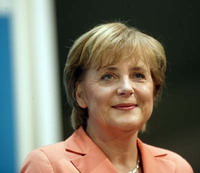European Union tries to improve relations with Russia
The European Union seeked prospects Monday for improving its strained relations with Russia - four days before German Chancellor Angela Merkel is to lead an EU delegation in talks with President Vladimir Putin.

Merkel, whose country holds the EU presidency, is to see Putin Friday in the Russian city of Samara at a time of soured bilateral relations. She hopes to jump start talks on a long-delayed "strategic partnership" with Russia.
"We need a new partnership and cooperation agreement," with Russia, Merkel told European lawmakers Monday in the Parliament in Berlin.
"We have a whole series of problems to overcome before the negotiations can start, but I hope at least that the summit will make clear that we are interested in a close strategic partnership with Russia," Merkel said.
A day earlier, she talked by phone with Putin. On Tuesday, German Foreign Minister Frank-Walter Steinmeier will pay an unscheduled visit to Moscow for talks with Putin and his Russian counterpart, Sergey Lavrov.
Estonian and Polish officials have suggested it might be better not to have the Samara summit, but Merkel and Steinmeier said it should go ahead because the EU and Russia needed one another, economically and politically.
The EU and Russia are mired in a series of disputes that mirror the downturn in US-Russia relations. On Monday, U.S. Secretary of State Condoleezza Rice was to hold talks with Russian officials in Moscow.
Putin is troubled by the U.S. proposal for a missile defense system in ex-Soviet satellite countries. Russia also disagrees with international partners over the current draft of a U.N. plan to give the southern Serbian province of Kosovo internationally supervised independence. And it is also threatening to freeze its compliance with a European conventional arms treaty.
Russia's increasing control of oil and natural gas supplies is causing concern in western European capitals that are already upset by Russia's 2005 ban on meat and plant imports from Poland over what Moscow says are hygiene concerns. Last month, Poland threatened to veto the EU-Russia summit over the import ban.
That trade dispute is also blocking the EU from beginning talks on a long-delayed "strategic partnership" with Russia, which the EU sees as a tool to get Moscow to commit to fair trade in energy.
In the EU view, by opening its vast energy sector to the EU and other investors, Russia would secure a major upgrade of its oil and gas pipelines, while the EU would get access to secure and affordable energy for the future.
Today, the EU imports 50 percent of its energy needs. This is expected to rise to 70 percent over the next 20-30 years. Gas imports alone may rise by 80 percent in the period, according to EU forecasts.
But Moscow has resisted making its energy sector subject to market economy rules. Although the EU still formally backs Russia's World Trade Organization membership, the access-to-energy issue is beginning to loom over Moscow's WTO application.
Russia tightened its grip Saturday on natural gas supplies from Central Asia by striking a deal with Turkmenistan and Kazakhstan to build a pipeline that would pump their gas into Russia's network of pipelines to Europe.
The new gas agreements are a blow to U.S. and European efforts to construct oil and gas pipelines from Central Asia that would cross under the Caspian Sea, avoiding Russia, and connect to Europe through Azerbaijan and Turkey.
The deal means Russia will control the bulk of Central Asian energy exports, boosting its role as a major supplier of oil and gas to Europe and strengthening Western fears that Moscow could use its energy clout for political purposes.
Subscribe to Pravda.Ru Telegram channel, Facebook, RSS!


